- Home
- Buckley, Fiona
The Siren Queen: An Ursula Blanchard Mystery at Queen Elizabeth I's Page 2
The Siren Queen: An Ursula Blanchard Mystery at Queen Elizabeth I's Read online
Page 2
“Gladys,” I said quietly, “come away, now. Come here.”
Gladys ignored me.
“There’s ain’t no such thing as witchcraft, look you. There’s just women that aren’t happy and women that are a bit odd. Leave her alone!”
“That’s right,” said Mistress Thomson resentfully. “Why can’t everyone let me be? If I want to sleep out here . . . ”
“I forbid it. For the last time, woman, I forbid it. Must I have you locked in your cottage until you learn sense? Come with me!”
“Leave her be!” yelled Gladys again, but Fleet strode forward, pulled Mistress Thomson’s rugs away, and seized her by the arm. Brockley said, “Easy now,” once again, and Hugh half moved to intervene, but Gladys’s volatile temper had flared and she acted faster than any of them. Stooping, she picked up a clod of earth from the pile beside the empty grave, and hurled it at Fleet. It struck him on the chest and broke, spattering earth all over him, and before either Hugh or I could reach her, Gladys had followed it up with another.
Abandoning Mistress Thomson, Fleet started angrily toward Gladys, who straightened up, dodged behind the pile of clods, and peered malevolently at him around the corner.
“Leave her be, you bully! Leave her be! Cold heart, that’s what you’ve got! You don’t know nothing about men and women. Let her alone! If you don’t, I’ll curse ye!”
“Oh no,” I moaned. “Gladys! Gladys! Stop that! Come here!”
“I’ll get her,” said Brockley, and both he and Hugh ran toward her. For a moment, I thought that a most irreverent game of tag was about to begin among the graves. But Gladys, though her walk was something of a hobble, could be surprisingly spry when she wanted to. She evaded them, retreating quickly behind a yew tree. Then, to my horror, she reappeared on the other side of it, pointing at Fleet with the forefinger and little finger of her left hand.
I picked up my skirts and I too ran toward her, shouting: “No, Gladys!” She sidestepped me, however, and then I tripped on the edge of a grave and almost fell. It had a headstone, which I caught at to steady myself, and meanwhile, Gladys, her threatening fingers leveled straight at Dr. Fleet, was well away. “I curse ye!” Her voice cut in eldritch fashion through the spring morning. “A cold curse for a cold heart!”
It struck me that Gladys’s way with ill-wishing was improving with practice, if improving were the right word. Even when she quarreled with our physician, she hadn’t sounded so vicious or so powerful. This was actually frightening. “I curse ye by a cold hearth and a cold bed . . . ”
“Gladys!” I pleaded aloud, but in vain.
“. . . a cold heart and a cold head, a cold belly and cold breath . . . ”
“Gladys!” wailed Fran Dale and Meg both together.
“. . . a cold life and a cold death!”
“For the love of God!” gasped Brockley. He had gone quite pale. Dale ran up and stood close to him as if for comfort. Hugh similarly hastened back to my side and we gazed at each other, appalled. Meg began to cry, and Sybil actually crossed herself, in the old-fashioned way.
Fleet said grimly: “I think there is unquestionably one real witch here in this churchyard. Don’t you?”
• • •
My memory of how we got Gladys away from that churchyard isn’t very distinct. I recall that Hugh fetched my uncle Herbert and aunt Tabitha from the house, and while bringing them back to the churchyard, somehow made them believe that Gladys was an old woman who had gone weak in the head, but nothing worse.
Somewhat bemusedly, they added their persuasions to ours and Hugh again resorted to that useful and universal solvent, money—this time in the form of a really large contribution to a fund that Fleet had started in order to put a new stained-glass window in the church.
This conversation took place in the vicarage, in the presence of Fleet’s wife. She was a wispy little thing, who seemed very nervous of him, which I could well understand. At one point she did say: “Poor Mistress Thomson! Shouldn’t we be kind to her?” but her husband glared at her so savagely that she said no more.
Fortunately, Brockley and Dale had already shown Mistress Thomson the recommended kindness, by persuading her to let them take her home. They rejoined us as we left the vicarage, saying that they had made her some broth and found a neighbor to stay with her. We put aside the visit to my mother’s grave and cried off the dinner invitation. Francis would have to be welcomed home without us.
Somehow or other, we got ourselves and Gladys safely back to Withysham. We knew, though, that the news would spread. Dr. Fleet would see that it did. The accusation was serious and no amount of money or talk of weak-minded age could be relied on to stifle it for long. Neither Withysham nor Hawkswood were safe places for Gladys now.
So when a messenger, most opportunely, arrived from a most unexpected quarter, with an invitation to visit London and perhaps consider an early betrothal for my daughter, Meg, we received him with pleasure.
Had it not been for that appalling scene in Faldene churchyard, we might have declined. Meg wouldn’t even be fourteen until June. But the proposal was only for a betrothal, with the actual marriage some years away, and there was no harm in looking at it.
“We can take Gladys with us and get her away from both Hawkswood and Withysham for a while, until the storm passes,” said Hugh. He added dryly: “She’s becoming an expensive luxury! Yes—I think we’d better all go to London.”
2
A Fashion for Marriage
“All the same, we’ll have to come home eventually,” I said glumly. “I think Gladys is going a little crazy in her old age.”
“I doubt it,” said Hugh in his dry way. “She’s just getting more ill-tempered, if you ask me. All we can do is give people time to forget about her. She can be useful in London. She can help Dale with plain sewing and so on. Tell her to bring along the herbs she uses for the headaches you get sometimes. Meg will like to have her with us. She’s fond of Gladys. Meg doesn’t believe she’s a witch, or crazy, and I fancy the lass is right.”
“I wish Meg were older,” I said doubtfully. “I don’t like these early betrothals.”
“There may not be a betrothal,” said Hugh easily. “We’re just . . . looking at the merchandise, shall we say? We’re not bound to enter into any agreement, and even if we do, betrothals aren’t as unbreakable as they used to be. We can change our minds if we like and so can Meg. We’re not going to force her into anything.”
“And it’s very kind of the Duke of Norfolk to concern himself with our affairs,” I agreed.
Hugh chuckled. “I rather think the word has got round that you are related to the queen. I don’t suppose he’d trouble himself otherwise!”
It was true. Few people knew it officially, but these things do slip out. The lover my mother had refused to name, when she came home from court, had been King Henry himself. Queen Elizabeth and I were half sisters. Elizabeth had light red hair while I was dark, and I had hazel eyes whereas hers were golden brown, so we didn’t look much alike, but in private, she acknowledged me as her half sister.
We had other links, as well. At one time, I had been one of her Ladies of the Privy Chamber, and for many years, before I married Hugh (and on one occasion, after), I had undertaken secret tasks for her and for Sir William Cecil, her Secretary of State, as an agent, charged with uncovering plots and traitors.
This too had got around, but although Thomas Howard of Norfolk was a member of the royal council and knew of my parentage, I don’t think he knew of my work as an agent. If he had, I’m sure he would never have invited me to stay at his London home in 1569, no matter how much he wished to please a relative of the queen, or find a suitable marriage prospect for his young undersecretary Edmund Dean.
• • •
The visit meant an upheaval for us. It interrupted the quiet life that Hugh and I both liked so much. At Hawkswood and Withy-sham alike, Hugh enjoyed his favorite pastimes of growing roses and playing chess, and I, while s
haring these pleasant interests, could also attend to Meg’s education, work at my embroidery, and go hawking, and forget that in the past I had rejoiced in the heady air of court intrigue and had hazarded my life in it, more than once—and the lives of my good servants Dale and Brockley, too. Going to London to stay with a member of the council no longer had much attraction for me.
The journey also meant problems for Hugh. Like Brockley, my husband was in his fifties, but while Brockley was fit for his age, Hugh suffered from stiff joints. To ride from Withysham to Faldene and back was his limit now and at that we went at a walking pace.
However, Hugh had recently bought a small coach, drawn by two sturdy horses, and hired a coachman—a rubicund, whiskered fellow called John Argent—to drive them and look after them. The track to Faldene was too rough for it, but we could use it on the road to London. Hugh would ride in the coach while the rest of us could go on horseback. We were quite a big party, since in addition to Brockley, we meant to take a couple of other men as escort. As Sybil was a poor horsewoman, she rode pillion with one of them. The other had to take Gladys up behind him. Hugh refused to share his coach with her. “I know you make her wash, my dear Ursula, but to me, she still smells,” he said.
Meg herself was intrigued by the idea of a betrothal. Hugh and I assured her that if when she met the young man, she didn’t like him, she had only to tell us, and that would be the end of the matter, and that there was in any case no question of marriage for years yet, but she showed no reluctance. In fact, she displayed rather more enthusiasm than I thought desirable in a girl so young.
However, having agreed that she should meet this young man, Edmund Dean, I must make the right preparations. As it chanced, I had lately had some new formal gowns in damask and satin stitched for her, in the clear, vigorous colors—crimson, orange-tawny, apple-green—that suited her dark hair and her intelligent brown eyes. There was a shortage of good fabrics just then and I wasn’t altogether satisfied with the quality of the materials, but at least the dresses were new, and in addition, I lent her some of my jewelry.
“But I can take my little silver pendant, can’t I?” she said anxiously, revealing that she was still very much a child. The pendant was a simple affair consisting of a very slim chain with a little heart dangling from it. The Hendersons, the people who were looking after her at the time, had had it made for her when she was six and it was her very first piece of jewelry. She was fond of it, though it was not nearly fine enough for a ducal dining chamber.
“Bring it if you like!” Hugh told her, laughing. “You’ll find you won’t want to wear it in front of the Duke of Norfolk!”
The visit to London would also mean a hiatus in her Latin and Greek studies. “Her tutor can have a holiday, but I can go on with teaching her French,” I said to Hugh. “That could be useful if this betrothal idea comes to anything and the young man has a future in diplomacy. If he’s in the duke’s household, he might well have, even if his immediate background is merchanting.”
The duke’s letter had described Edmund Dean’s background in some detail. He came of a good family with land in Hertfordshire. His father, however, had been a younger son, who had to make his own way in the world and, unusually for a man born into a landed family, had chosen to do so as a merchant. He had done well, and Edmund, though he too was a younger son, had had every hope of setting up in business for himself, with some help from his father until . . .
You will of course be aware of the current trade embargo with Antwerp, the duke’s letter had said. Edmund’s father has suffered great damage to his business, as have many such men. Edmund has therefore felt obliged to take employment outside the world of merchanting. However, he hopes that his father’s circumstances will recover and that he himself will prosper in my household, and that by the time your daughter reaches the age of, perhaps, seventeen, he will be in a position to wed.
I certainly knew about the embargo, which was the reason for the shortage of some silken fabrics, not to mention furs, dyestuffs, lamp oil, sugar, and spices, which had hitherto come to England via Antwerp. It all went back to what—I must be honest—had been a piece of frankly sharp financial practice on the part of Queen Elizabeth and her Secretary of State, Sir William Cecil.
They were always anxious to improve England’s solvency while doing anything they possibly could to damage that of Philip of Spain and they had combined the two, most successfully, the previous December, when four Spanish ships unwisely took refuge from pirates by scattering and then putting into Plymouth and Southampton. They were carrying between them £85,000 for the Netherlands, where Spanish troops were waiting for their pay. The money had been advanced to Spain by Genoese bankers but still belonged to the Genoese until it reached the Low Countries. Elizabeth and Cecil had had the happy thought of borrowing it instead.
Well, that was one way of putting it. I still maintained an occasional correspondence with some of the ladies I had known at court as fellow attendants on the queen, or as wives of courtiers. According to one of them, my old friend Mattie Henderson, Guerau de Spes, the new Spanish ambassador, said roundly that she had snatched it, and been put under house arrest as a result.
My husband says that de Spes is an outspoken man, often amusing, for he has a whimsical manner of speech, but he is not much liked, said Mattie’s letter. He is blatant in his Catholic observances and my Rob thinks he sees himself as a kind of crusader, bound by oath to bring poor benighted England back to the one true faith. Rob says it is useless to argue with him—he lives in a world of heroic fancy and all arguments just run off him like water off a duck’s plumage.
I had come across that sort of thing before. My second husband, Matthew, had been a little like that. He, though, had had more tact than this man de Spes had, by the sound of it.
The Genoese agents in London, who didn’t care who borrowed their money as long as they could rely on getting it back, said that Elizabeth’s credit was better than Philip’s and agreed to the deal. The result was that the indignant Spanish administration in the Low Countries closed Antwerp to English vessels and put several English merchants in the Netherlands under arrest. In England, a number of Spanish traders were locked up in retaliation. Relations between Spain and England were now strained, to put it mildly, and many formerly prosperous merchants were suffering lean times or had even gone bankrupt. Master Dean Senior had been among the victims.
“If we do reach an agreement,” I said, “I’ll be firm about one thing. No marriage until this man is in a position to look after Meg properly.”
We sent a messenger back ahead of us, accepting the invitation, and were on our way three days after that calamitous visit to Faldene.
• • •
We spent a night on the way, dined next day at an inn just outside London, and then went on toward the City, passing Whitehall, where the court was in residence, and traveling along the Strand, with its fine mansions, where a number of ambassadors had their residences and where Cecil also lived.
We were held up in the Strand by a minor procession, going toward Whitehall, which obliged us to move to the side of the road and wait for it to pass. For the most part, it consisted of gentlemen on foot, but in the center of it was a man on a gray horse.
He passed close enough for us to see that his dark velvet cloak and cap had a thick trimming of fur, as though England’s spring sunshine hadn’t warmth enough for him, and for a moment, I saw his face clearly. It was pale, high in the cheekbone, so that his eyes seemed to look at the world over ramparts, and his mouth was folded into what looked like a permanent and contented smile. It was a curious face, a mixture of cold and warm, wary and self-assured. I didn’t like it.
“Who in the world is that?” Hugh wondered aloud, popping his head out of his coach, but he was answered immediately as one of the gentlemen on foot, irritated by some passersby who hadn’t got out of the way fast enough, raised his voice in a shout of “Make way for the Spanish ambassador.”
; “I thought he was under house arrest,” said Hugh.
“By the look of it, he’s been let out,” I said. “And very pleased about it he seems, too!”
We reached the duke’s house, which was within the City proper, close to the busy thoroughfare of Bishopsgate, in the afternoon. The last stage of the journey was through crowded, noisy streets where our coachman, John Argent, in accordance with the law, dismounted from his box and led the horses, a wise precaution, for the shouts of the street vendors manning roadside stalls or pushing handcarts through the throng, declaring at the tops of their voices that theirs were the finest gloves, cheeses, hot meat pies, and mousetraps in the land, were an assault on one’s hearing. Our horses laid back indignant ears and Argent had to soothe them, in the intervals of exchanging ruderies with devil-may-care coachmen, who were breaking the law and were still driving their charges, clattering along to the peril of anyone who got in their way.
Our animals snorted, too, at the stench from the drainage ditches that ran down the middles or sides of the streets, sidestepping away from them as daintily as the elegant ladies who walked along holding their skirts clear of the dirty cobbles and sniffing at scented pomanders. Argent had his hands full.
The elegant ladies were very elegant indeed. I was realizing how long I had been away from the center of things. Clothes I had thought fashionable were far behind the times. The simple, round French hood had been replaced, apparently, by a hood that dipped above the center of the forehead, into a heart-shape, often edged with pearls or lace, and the latest ruffs were very big indeed. Too big, I thought, for beauty. The new starch had made them possible, but I didn’t like them and said so to Hugh, when, at last, we reached the courtyard of Howard House, Norfolk’s London residence, and my husband climbed out of the coach.
“You’d better invest in some up-to-date fashions, all the same,” he remarked with a chuckle. “Whether you like them or not, or you’ll look provincial. His Grace is a widower, so the woman coming down the steps must be his housekeeper, but if that ruff standing out behind her head is under a foot wide, I’m the King of Cathay.”

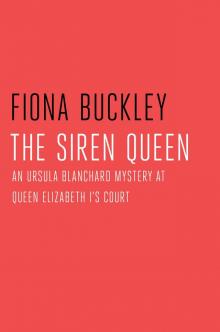 The Siren Queen: An Ursula Blanchard Mystery at Queen Elizabeth I's
The Siren Queen: An Ursula Blanchard Mystery at Queen Elizabeth I's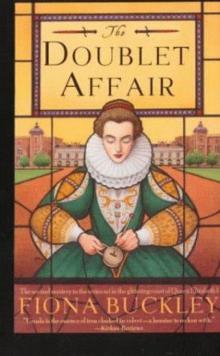 The Doublet Affair (Ursula Blanchard Mysteries)
The Doublet Affair (Ursula Blanchard Mysteries)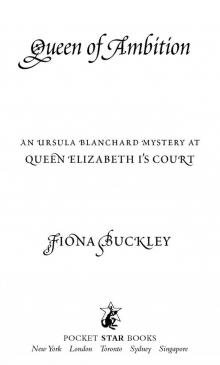 Queen of Ambition
Queen of Ambition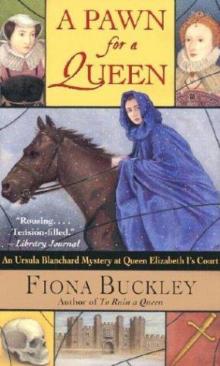 A Pawn for a Queen: An Ursula Blanchard Mystery at Queen Elizabeth I's (Ursula Blanchard Mystery at Queen Elizabeth I's Court)
A Pawn for a Queen: An Ursula Blanchard Mystery at Queen Elizabeth I's (Ursula Blanchard Mystery at Queen Elizabeth I's Court)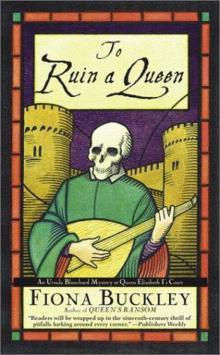 To Ruin A Queen: An Ursula Blanchard Mystery at Queen Elizabeth I's Court
To Ruin A Queen: An Ursula Blanchard Mystery at Queen Elizabeth I's Court